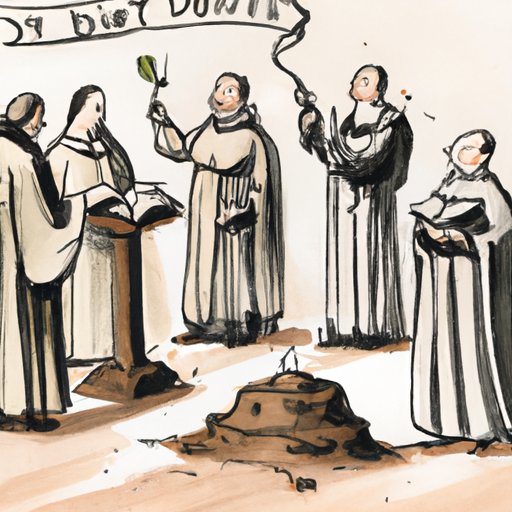
Introduction
One of the most significant events of the Reformation era was the Diet of Worms. The event is popular among historians and theologians as one that completely changed the course of history. This article aims to provide an in-depth analysis of what the Diet of Worms was, how it got its unusual name, and the remarkable impact it had on religion and politics.
Unpacking the Diet of Worms: Understanding the Significance of this Historic Event
The Diet of Worms was a historic assembly that was held in Worms, Germany, from 28th January to 25th May 1521. This assembly was a politically important meeting that involved the Holy Roman Emperor Charles V and the German princes.
The primary objective of the Diet of Worms was to address the religious tensions and conflicts that had accumulated during the Reformation. The meeting was organized with the goal of resolving these issues and finding a lasting solution to the various religious differences among the German states.
The Unusual Name of a Significant Event: The Diet of Worms Explained
The Diet of Worms got its name from the city of Worms, which was selected as the meeting location. The name Worms can be traced back to the Celtic and Roman times, and it comes from the Germanic word “Warmaisa,” which means place on the water.
The city has a peculiar history behind its name, as some historians believe that Worms was named after the legendary dragon named “Worm,” which was said to have lived by the Rhine River. According to local folklore, the dragon used to eat local villagers until it was killed by Siegfried, a legendary hero.
A Fortunate Mistake: How the Diet of Worms Changed History Through its Unintentional Outcome
One of the most significant and unexpected outcomes of the Diet of Worms was Martin Luther’s refusal to recant his beliefs. Martin Luther was a German theologian and professor who had gained popularity for his criticism of the Catholic Church. During the Diet of Worms, he was summoned to recant his teachings, but he refused, uttering the famous phrase: “Here I stand, I can do no other, God help me. Amen.”
Luther’s refusal was unexpected, and it caused an uproar among the German princes who saw the stance he had taken as both a political and religious threat. This led to Luther’s excommunication from the Catholic Church, sparking the birth of Protestantism and leaving a lasting impact on religion and history.
The Role of Religion in the Diet of Worms: A closer look at the impact on the Reformation
During the time of the Diet of Worms, the Catholic Church was perceived to be corrupt, and a significant portion of the population disagreed with many of its teachings. Martin Luther’s ideology sparked a reformation movement that inspired many people to embrace new religious ideas that deviated from the traditional teachings of the Catholic Church. This led to the formation of the Protestant Church and a larger divide between the Catholic Church and its followers.
Diet of Worms: A convergence of politics, religion, and food
The Diet of Worms was not only significant in terms of religion and politics, but it was also noteworthy for its cuisine. At the time, Worms was known for its vibrant culinary scene, and it hosted a wide variety of meals and delicacies. Due to the lengthy nature of the diet, the German princes would indulge in meals featuring a vast array of local delicacies.
Meals served during the diet included specialties such as sausages, cheeses, and wine. In addition, one of the most popular dishes was “Diet Pie,” a pastry stuffed with pork and game meat. The dish was specially made for the event and was a hit with everyone present.
Martin Luther’s Refusal to Denounce His Teachings at the Diet of Worms
During the Diet of Worms, Martin Luther was questioned about his teachings and summoned to recant his beliefs. However, he refused and became the subject of intense scrutiny and criticism from both the Catholic Church and German princes.
Despite the pressure exerted on him, Luther remained steadfast in his convictions. His refusal to recant his beliefs was seen as an act of defiance, and it earned him a massive following. His teachings became wildly popular, and he became a significant figure in the Protestant Reformation movement.
The Infamous Meeting: What Actually Happened at the Diet of Worms?
The Diet of Worms was a long and heated meeting that lasted for several months. The meeting was attended by a wide variety of people, including German princes and members of the Catholic Church.
During the meeting, discussions ranged from religion to politics, and it was apparent from the outset that it was an emotionally charged environment. Despite the intensity of the discussions, the position of Martin Luther remained unaltered, and the event led to his excommunication from the Catholic Church.
Conclusion
The Diet of Worms was a pivotal event that continues to be discussed by scholars and historians. The event was significant in many respects, and it has left a lasting impact on politics, religion, and cuisine. Understanding the background and significance of the event remains an essential part of learning and appreciating the rich history of Germany and Europe at large.
Understanding the reasons behind the meeting and the implications of Martin Luther’s refusal is critical. Also, Diet of Worms stands testament to the power of culinary culture and how food plays a key role in significant events.




